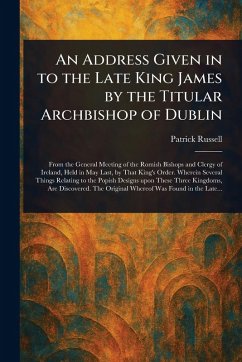
Sketch of the Reformation in England

PAYBACK Punkte
10 °P sammeln!
"Sketch of the Reformation in England" by John James Blunt offers a detailed exploration of England's tumultuous break from the Roman Catholic Church. This meticulously researched historical text delves into the key events and figures that shaped the English Reformation, with particular emphasis on the reign of Henry VIII and the establishment of the Church of England. Blunt's work provides valuable insight into the religious and political landscape of the era, examining the profound social changes brought about by religious reform. A key resource for understanding the Renaissance in Europe an...
"Sketch of the Reformation in England" by John James Blunt offers a detailed exploration of England's tumultuous break from the Roman Catholic Church. This meticulously researched historical text delves into the key events and figures that shaped the English Reformation, with particular emphasis on the reign of Henry VIII and the establishment of the Church of England. Blunt's work provides valuable insight into the religious and political landscape of the era, examining the profound social changes brought about by religious reform. A key resource for understanding the Renaissance in Europe and the broader history of Christianity, this book remains essential reading for anyone interested in religious history, the Reformation, or the intricate history of England. A compelling account of a pivotal moment in European history, "Sketch of the Reformation in England" presents a clear and insightful narrative of this transformative period. This work has been selected by scholars as being culturally important, and is part of the knowledge base of civilization as we know it. This work is in the public domain in the United States of America, and possibly other nations. Within the United States, you may freely copy and distribute this work, as no entity (individual or corporate) has a copyright on the body of the work. Scholars believe, and we concur, that this work is important enough to be preserved, reproduced, and made generally available to the public. We appreciate your support of the preservation process, and thank you for being an important part of keeping this knowledge alive and relevant.














